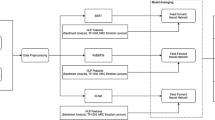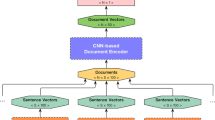Abstract
As an important medium for users to share experiences and feelings, social media is the carrier of users’ emotions, hobbies and interests, and it has become an important research content to mine user's personality information. Due to the unstructured and sparse characteristics of social texts, it is difficult to grasp the fine-grained word segmentation and contain a large number of noise words in mining user personality characteristics. However, the probability model of traditional language rules has weak generalization ability, and the deep learning model has poor anti-noise performance and poor feature extraction ability. This paper proposes a text analysis model based on attention mechanism, referred to as ATCNN-BiGRU. The model uses the attention mechanism to construct the input feature matrix of the text, solves the interference of noise in the social text, and integrates the double-layer gated unit network to overcome the problem that the fixed-step scanning mechanism in the convolutional neural network affects the extraction of global contextual semantic features. Through the experimental results on datasets in three different domains and different languages, it is found that compared with the existing mainstream text analysis models, the ATCNN-BiGRU proposed in this paper has a significant improvement in the prediction accuracy, especially in the Chinese data set by 2%.
Access this chapter
Tax calculation will be finalised at checkout
Purchases are for personal use only
Similar content being viewed by others
References
Yang, R., Guo, Y.: Characteristics, problems and psychological analysis of college students’ network social behavior. Adv. Psychol. 12, 777 (2022)
Wang, Z.: Research on Recommendation Algorithm Based on Review Text. Inner Mongolia University, Hohhot (2020)
Covington, P., Adams, J., Sargin, E.: Deep neural networks for youtube recommendations. In: ACM Conference on Recommender Systems, pp. 191–198. ACM (2016)
Chen, X., Li, S., Li, H., et al.: Generative adversarial user model for reinforcement learning based recommendation system. In: International Conference on Machine Learning, pp. 1052–1061. PMLR (2019)
Wang, P.: Research on Personalized Recommendation Algorithm Based on User Characteristics. Shandong Normal University, Jinan (2018)
Geng, L.: A Weibo Public Opinion Monitoring Model Based on Sentiment Analysis. Northwest Normal University, Lanzhou (2020)
Patel, J., Chhinkaniwala, H.: A fusion of aspect and contextual information for rating prediction in recommender system using a latent factor model. Int. J. Web Eng. Technol. 16(1), 30 (2021)
Wang, X., Yuan, J., Qin, F.: Point-of-interest recommendation based on comment text in location social network. Comput. Sci., 251–254 (2017)
Xie, J., Zhu, F., Guan, H., et al.: Personalized query recommendation using semantic factor model. China Commun. 18(08), 169–182 (2021)
Wang, H., Zuo, Y., Li, H., et al.: Cross-domain recommendation with user personality. Knowl.-Based Syst. 213(8), 106664 (2021)
Perozzi, B., Al-Rfou, R., Skiena, S.: Deepwalk: online learning of social representations. In: Proceedings of the 20th ACM SIGKDD International Conference on Knowledge Discovery and Data Mining, pp. 701–710 (2014)
Sun, X., Guo, J., Ding, X., et al.: A general framework for content-enhanced network representation learning. arXiv preprint arXiv:1610.02906 (2016)
Mikolov, T., Chen, K., Corrado, G., et al.: Efficient estimation of word representations in vector space. arXiv preprint arXiv:1301.3781 (2013)
Pan, Y.: Intelligent Recommendation System for College Entrance Examination Based on Machine Learning. Nanjing University of Posts and Telecommunications, Nanjing (2019)
Lei, C., Dai, H., Yu, Z., et al.: A service recommendation algorithm with the transfer learning based matrix factorization to improve cloud security. Inf. Sci. 513, 98–111 (2020)
Duan, M.: Research on Text Sentiment Analysis Based on Fusion of Dictionary and Word Vector. Xidian University, Xi’an (2019)
Ombabi, A.H., Lazzez, O., Ouarda, W., et al.: Deep learning framework based on Word2Vec and CNN for users interests classification. In: Sudan Conference on Computer Science & Information Technology, pp. 1–7 (2017)
Wang, Y., Lei, L.: Sentiment Analysis using Word2vec-CNN-BiLSTM Classification. In: 2020 Seventh International Conference on Social Networks Analysis, Management and Security (SNAMS) (2020)
Kim, Y.: Convolutional Neural Network for Sentence Classification. University of Waterloo, Waterloo (2015)
Niu, X.Y.: CNN text classification based on topic model word vectors. Comput. Modern. 10, 7 (2019)
Vo, D., Zhang, Y.: Target-dependent twitter sentiment classification with rich automatic features. In: Proceedings of Twenty-Fourth International Joint Conference on Artificial Intelligence, Palo Alto, CA:AAAI, pp. 1374–1353 (2015)
He, Y.X., Sun, S.T., Niu, F.F., et al.: A deep learning model enhanced with emotion semantics for microblog sentiment analysis. Chin. J. Comput. 40(4), 773–790 (2017)
Wang, J., Zhang, Y., Yu, L.C., et al.: Contextual sentiment embeddings via bi-directional GRU language model. Knowl.-Based Syst. 235, 107663 (2022)
Zhang, X., Lian, X., Dai, X., et al.: CNN_BiGRU text classification model based on part-of-speech features. Comput. Appl. Softw. 38(11), 155–161 (2021)
Eslami, E., Yun, H.B.: Attention-based multi-scale convolutional neural network (A+ MCNN) for multi-class classification in road images. Sensors 21(15), 5137 (2021)
Cheng, Y., Yao, L., Zhang, G., et al.: Multi-channel CNN and BiGRU based text sentiment analysis based on attention mechanism]. Computer Research and Development 57(12), 2583–2595 (2020)
Zhang, T., You, F.: Research on short text classification based on TextCNN. J. Phys: Conf. Ser. 1757(1), 012092 (2021)
Tao, Y., Zhang, X., Shi, L., et al.: Research on multi-feature fusion method for sentiment analysis of short texts. Small Microcomput. Syst. 41(6), 7 (2020)
Tao, Y., Zhang, X., Shi, L., et al.: Joint embedding of emoticons and labels based on CNN for microblog sentiment analysis. In: 2019 IEEE Fourth International Conference on Data Science in Cyberspace (DSC). IEEE (2019)
Dhola, K., Saradva, M.: A comparative evaluation of traditional machine learning and deep learning classification techniques for sentiment analysis. In: 11th International Conference on Cloud Computing, Data Science & Engineering 2021 (2021)
Acknowledgments
This paper is supported by the Inner Mongolia Natural Science Foundation Project (2020MS07018), the Graduate Research Innovation Project of Inner Mongolia University (11200–5223737), the National Natural Science Foundation of China (61862046) and the Inner Mongolia Autonomous Region Scientific and Technological Achievement Transformation Project (CGZH2018124).
Author information
Authors and Affiliations
Corresponding author
Editor information
Editors and Affiliations
Rights and permissions
Copyright information
© 2023 The Author(s), under exclusive license to Springer Nature Singapore Pte Ltd.
About this paper
Cite this paper
Zheng, Y., Shen, J., Jia, R., Li, R. (2023). Research on User Personality Characteristics Mining Based on Social Media. In: Sun, Y., et al. Computer Supported Cooperative Work and Social Computing. ChineseCSCW 2022. Communications in Computer and Information Science, vol 1681. Springer, Singapore. https://doi.org/10.1007/978-981-99-2356-4_8
Download citation
DOI: https://doi.org/10.1007/978-981-99-2356-4_8
Published:
Publisher Name: Springer, Singapore
Print ISBN: 978-981-99-2355-7
Online ISBN: 978-981-99-2356-4
eBook Packages: Computer ScienceComputer Science (R0)





